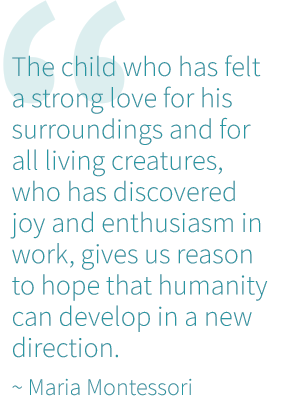
Frequently asked questions
Montessori encompasses a philosophy by which children are allowed to develop naturally and fully, each at his or her own pace. Under the guidance of a certified Montessori Directress, in a specially prepared environment and using carefully formulated materials, children are given the opportunity to learn in the best ways – by choice and by discovery. The dual qualities of independence and a love of learning, natural tendencies for the children, are nurtured in such a way that both competence and confidence result. These competent and self-confident young people have the necessary tools for successful future learning and living.
Between the ages of two and a half and four and a half is when most of your child’s intelligence and social characteristics will be formed. This is also when your child is most receptive, curious, and excited about exploring the world around him or her. A Montessori classroom nurtures that excitement and curiosity by offering a variety of materials to stimulate and intrigue your child.
The Montessori Directress is trained to recognise when your child is ready to learn a new skill, and to foster his or her natural instincts and abilities. Your child is valued as an independent thinker and encouraged to make choices on his or her own. A Montessori education provides students of all ages with information in a way they can understand and enjoy. Learning is fun, empowering, and custom-fit to suit your child’s individual learning style.
You will see the minute you walk into one of our classrooms. The materials used to teach reading, writing, arithmetic, geography, science, music, and social studies are all unique to the Montessori classroom. Classroom materials developed for our youngest students, for example, take abstract ideas and put them in a concrete form that makes sense to their developing minds.
Unlike other schools, your child will also share his or her Montessori classrooms with older and/or younger students. This way, students learn from their peers and respect their own and each other’s ability to be a teacher as well as a student. Finally, Directresses observe their students, stepping in when they see a child is 'stuck' or ready to learn a new skill.
Whether the child attends another private school or goes on to public school, Montessori education provides an excellent background for traditional education. Studies show that Montessori children adjust well and excel in their studies. They spend their time more productively because of their self-direction and positive attitudes toward learning.
Our Directresses are trained to observe children as they work. When a child has mastered a skill, the Directress will give the child a lesson that is more challenging, giving special attention to the age and interest of each child. And because the environment is so stimulating and exciting, children seldom do nothing. There are hundreds of prepared lessons for the child to choose from every day.
While it is true that many of the activities are individualised, this is important so that children can work at their own pace without feeling competitive or frustrated about their own progress. However, there are several activities that do involve group participation. Also, during the day, children participate in circle time together, eat lunch together, play outside together. One of the principles of the Montessori program is to help your child develop socially so that they can achieve a respect of others and work well together within a group environment.
Montessori education is founded on a belief in the development potential of each individual, but our system of education may not suit all parents. A positive learning experience requires that the parents and the school share a common view on the purpose of education. This common view creates the supportive triangle when parents, Directress and child are all working together for the benefit of the child.
Parents have to observe a classroom and be interviewed before a place can be offered. Farmhouse Montessori also offers a series of parent evenings during the school year where parents can learn more about aspects of our curriculum and the latest educational theories and how they are incorporated within the curriculum. Prospective parents are welcome to attend these evenings to learn more about Montessori and the school. Parents are also encouraged to observe their children working within the school environment.
The three year cycle is a basic tenet of the Montessori philosophy, as we believe the relationship developed with the child creates a strong working bond. The Directress gets to know the members of her classroom and their strengths and weaknesses very well. We have found that the three year cycle also encourages parents to communicate with their child’s teacher in a more meaningful way.
This cycle also facilitates the child’s need to work at their own pace and to work with different class members. One day a child may be working on a project with children two years his senior, and then at another time with younger children, consolidating their mathematical skills by relaying their own knowledge. Thus, each child is given the opportunity to learn from others, both adults and children.
A decision to withdraw a child from a Montessori classroom can affect the entire class, since the composition of the classroom is balanced by age and gender as far as possible. If a child is withdrawn before the completion of a three year cycle, there may indeed be gaps in their learning as each individual program is of a three year duration and the social dynamics of the classroom may be altered.
Experience – sensorial-based learning, sensations, ideas and facts, stories, pictures, making things work. Seeing, hearing, touching, smelling and tasting prepare the ground for understanding.
Environment – a quiet, organised, child-sized workplace where there is space to explore, time to discover, and differentiated tools for learning.
People – everyone has something to teach, and something to learn. Teachers observe and guide, older children learn from the younger, and the younger from the older.
